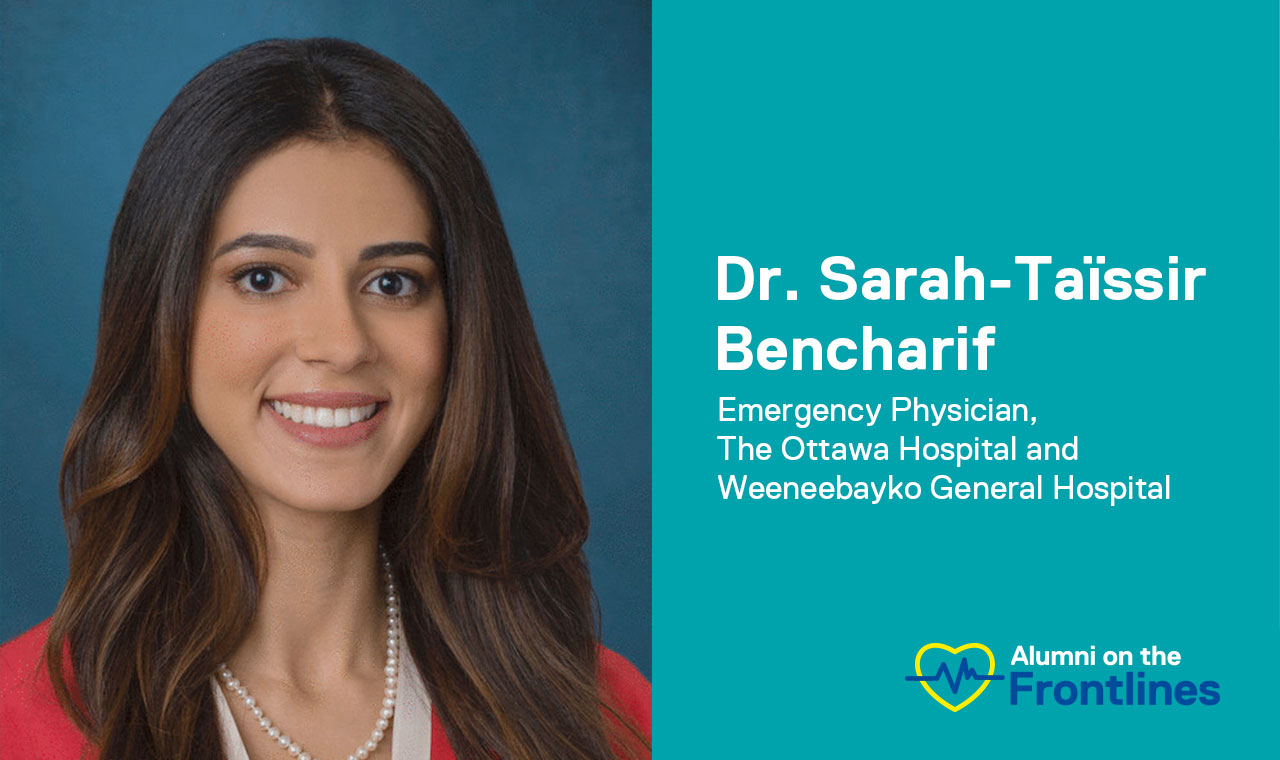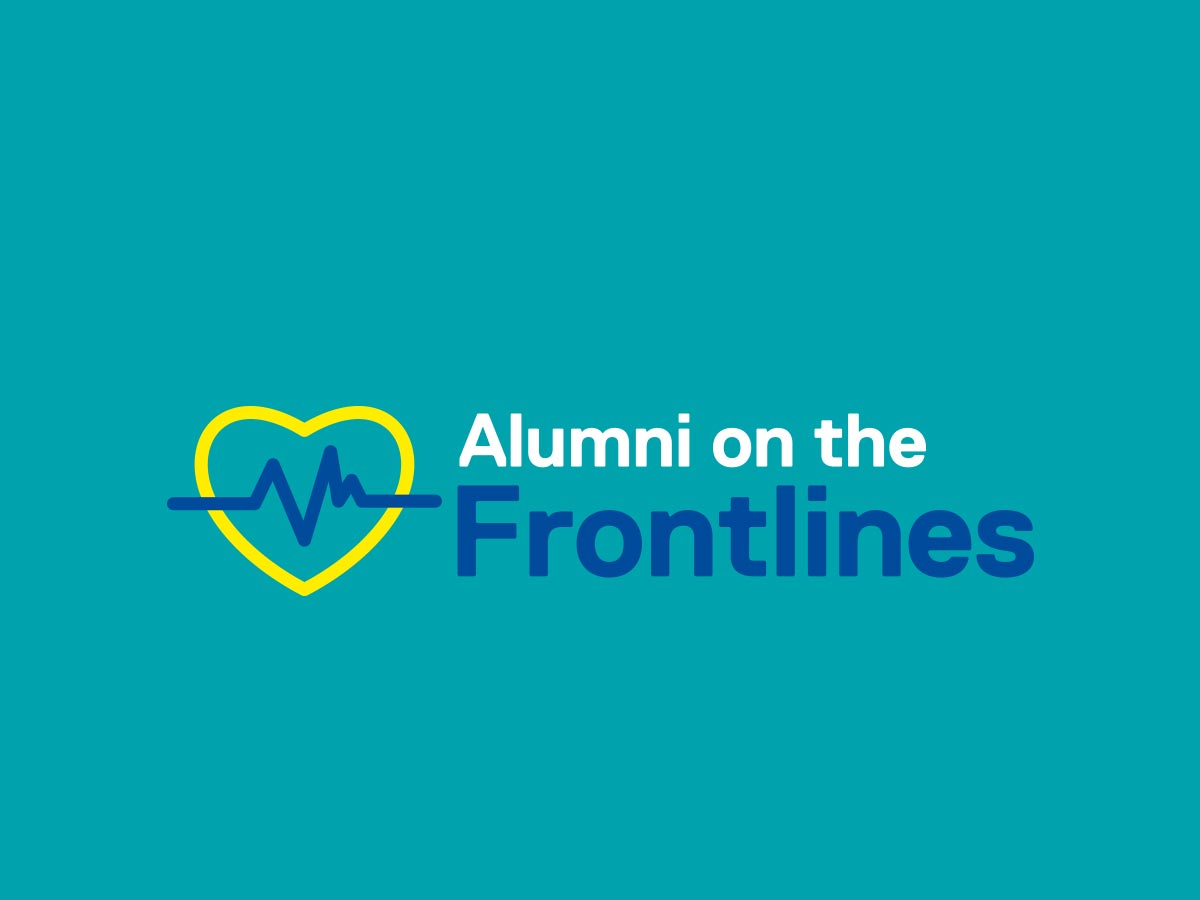Dr. Sarah-Taïssir Bencharif

Sarah-Taïssir Bencharif is an Emergency Physician at The Ottawa Hospital and Weeneebayko General Hospital in northern rural Ontario.
During the COVID-19 pandemic, healthcare professionals, food service workers, truck drivers and countless more involved in the supply chain for essential goods and services are working harder than ever and facing considerable personal risk for the good of society. In this series, we asked alumni on the frontlines of this pandemic to share their experience with us.
Sarah-Taïssir Bencharif is an Emergency Physician at The Ottawa Hospital and Weeneebayko General Hospital in northern rural Ontario. She works with patients in the Emergency Department with all kinds of illnesses and concerns, including coronavirus.
What does your day-to-day look like?
One of the neat things about emergency medicine is that we never know what will come through our doors. Every day looks a bit different. These days, we’re seeing patients with COVID-19 coming to the ER when they have severe symptoms such as difficulty breathing. But in addition, people are still having heart attacks, strokes, sustaining injuries, or having mental health crises, amongst other medical emergencies. The day to day varies as well because we work shifts; sometimes my shift starts at 4am, other times at 6pm, etc.
Taking care of patients in the ER takes the work of a strong team, of which I am only one part—I work with nurses, respiratory therapists, patient care assistants, housekeepers, social workers, clerks, lab technicians, pharmacists, and so many others, to provide this care in a safe environment. As a doctor, I assess my patients by taking a good history of their illness when possible, examining them, doing the necessary tests or procedures, and offering treatments and plans. This can vary from putting a cast on someone’s broken arm to running a resuscitation for someone whose heart just stopped. It’s a fast-paced job that requires a great deal of adaptability to various situations, and being able to identify and treat life-threatening illnesses quickly and safely.
Can you tell us how your job has changed since the emergence of the COVID-19 pandemic?
The most palpable way it has changed is that we now wear personal protective equipment (PPE) for far more patients. PPE takes time to put on properly, and just as importantly, to take off safely. We now wear masks all day in the ER. In addition, for patients with symptoms concerning for coronavirus, we wear a gown, a face shield, and gloves.
This fear of contamination has changed my routine after my shift ends, too. My colleagues and I have developed all kinds of decontamination routines to avoid bringing the virus home. For me, this involves wearing scrubs that the hospital provides and washes, disinfecting anything on myself (like my badge, my pen), changing into clean clothes I keep in a separate bag, removing my shoes outside the house, cleaning my car, and taking a shower as soon as I get home. We are all diligent with hand washing, not touching our faces, and continuing physical distancing. It’s hard, but we know this is what works.
What is the biggest challenge you are facing?
One of the biggest challenges I am facing is deciding if and when I should live separately from my loved ones. I have kept to myself in our home, avoiding contact with my family members as much as possible, especially as I have some who have other health conditions that make them more vulnerable. It’s been difficult trying to decide what would be the tipping point for me to move to another temporary place — and for how long? — with all this going on. It’s why I’m so diligent with my decontamination routine before coming home and it’s a decision I re-evaluate every single day.
What has been a source of comfort and happiness for you during this time?
I’m optimistic that if we all do our part — staying home, physically distancing, washing our hands often, avoiding touching our faces, self-isolating when sick — that we will be able to limit the ravages of COVID-19. Hearing that our communities are heeding that advice gives me comfort and hope. And, to be honest, I feel lucky to be able to do this work I love and to have maintained a constant in my life in these rapidly-changing circumstances. My sources of comfort have been the same as before the pandemic: the love of my husband, our family, my closest friends, remembering all the ways I am so lucky and fortunate in life. I’ve also made a more concerted effort to carve out time every day to do some writing and reading, things that nourished my mind even before COVID-19.
What do you want people to know about your experience during this time?
I want people to know their efforts in this pandemic matter and are essential. I also want people to know that as healthcare workers, we are doing our best and adapting to a rapidly-evolving situation, that we are trying to keep our patients and ourselves safe. I encourage everyone to stay informed through reliable information from their local public health agency. This pandemic has been hard for everyone in different ways and certainly to varying degrees. It’s been a time full of grief for so many; I hope we can also find those moments of grace to get us through.

